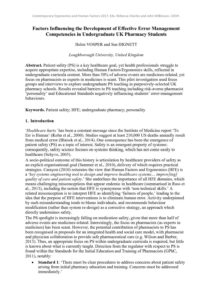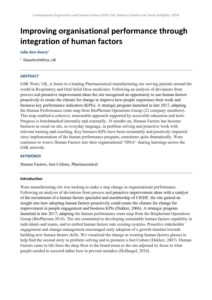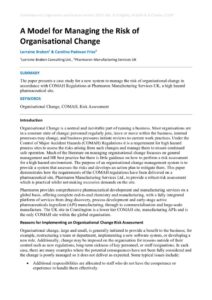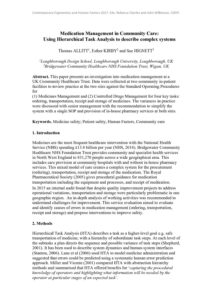Pharmaceutical
Factors Influencing the Development of Effective Error Management Competencies in Undergraduate UK Pharmacy Students
| Document | Author Helen VOSPER and Sue HIGNETT |
| Abstract Patient safety (PS) is a key healthcare goal, yet health professionals struggle to acquire appropriate expertise, including Human Factors/Ergonomics skills, reflected in undergraduate curricula content. More than 50% of adverse events are medicines-related, yet focus on pharmacists as experts in medicines is scant. This pilot investigation used focus groups and interviews to explore undergraduate PS teaching in purposively-selected UK pharmacy schools. Results revealed barriers to PS teaching including risk-averse pharmacist ‘personality’ and Educational Standards negatively influencing students’ error-management behaviours. |
Improving organisational performance through integration of human factors
| Document | Author Julie Ann Avery |
| Abstract GSK Ware, UK, is home to a leading Pharmaceutical manufacturing site serving patients around the world in Respiratory and Oral Solid Dose medicines. Following an analysis of deviations from process and proactive improvement ideas the site recognised an opportunity to use human factors proactively to create the climate for change to improve how people experience their work and business key performance indicators (KPIs). A strategic program launched in late 2017, adapting the Human Performance route map from BioPhorum Operations Group (22 company members). This map enabled a cohesive, measurable approach supported by accessible education and tools. Progress is benchmarked internally and externally. 18 months on, Human Factors has become business as usual on site, in everyday language, in problem solving and proactive work with relevant training and coaching. Key business KPIs have been sustainably and positively impacted since implementation of the human performance program, sometimes quite dramatically. Ware continues to weave Human Factors into their organisational “DNA” sharing learnings across the GSK network. |
A Model for Managing the Risk of Organisational Change
| Document | Author Lorraine Braben & Carolina Padovan Frias |
| Abstract The paper presents a case study for a new system to manage the risk of organisational change in accordance with COMAH Regulations at Pharmaron Manufacturing Services UK, a high hazard pharmaceutical site. |
Medication Management in Community Care: Using Hierarchical Task Analysis to describe complex systems
| Document | Author Thomas ALLITT, Esther KIRBY and Sue HIGNETT |
| Abstract This paper presents an investigation into medication management at a UK Community Healthcare Trust. Data were collected at two community in-patient facilities to review practice at the two sites against the Standard Operating Procedures for (1) Medicines Management and (2) Controlled Drugs Management for four key tasks: ordering, transportation, receipt and storage of medicines. The variances in practice were discussed with senior management with the recommendation to simplify the system with a single SOP and provision of in-house pharmacy services at both sites. |




